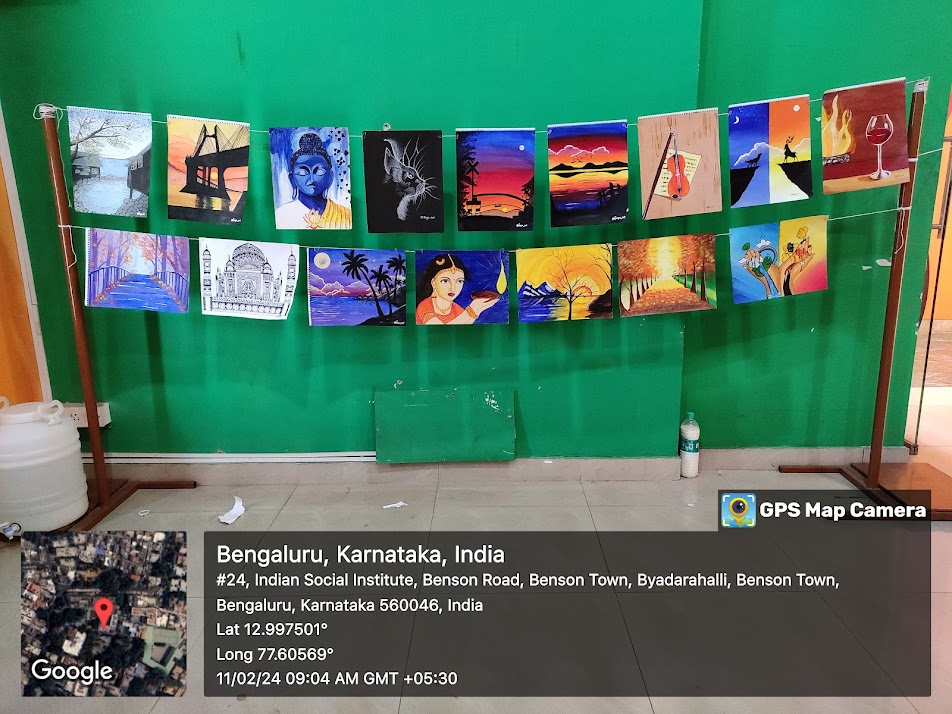


YOUTH ‘DREAM’ TO BRING ‘SOCIAL CHANGE’ IN THE LIVES OF THE MARGINALISED
More than half of India’s population are Youth. And youth have great potentials provided they are given equal opportunities to grow and contribute to the nation building. In this context, Indian Social Institute, which works for the development of the marginalised communities focused on the capacity building of rural youth who will take leadership to accompany and serve the marginalised communities. The basic module training builds the capacities of youth to address the social needs of their own community. This programme is operated at the South India Level since 2017. After the completion of Batch I in 2022, the institute continued with Batch II in collaboration with local NGOs in South India. The Batch II, 2022-2024 completed the capacity building training and the culmination of gathering fruits took place on 10 & 11 February, 2024 in the South India Level Cultural Meet held at Indian Social Institute.
In this two day event, 126 youth and 26 NGO partners came together with a spirit of unity to reflect and share their learnings, success stories and future commitments. They said, the six basic modules i.e, Self and society, Democracy and citizenship, People’s entitlements, Understanding and reducing vulnerabilities, Women and mother earth and participation and accountability provided them immense learning and built their leadership attitude.
In Karnataka State, 72 youth, 40 male and 32 female from KGF, Vijayapura, and Gulbarga were trained. 140 youth, male 32 and female 108 from Tamil Nadu and Pondicherry went through the capacity building training. In Andhra Pradesh and Telangana, 133 youth, male 75 and female 58 were trained and in Kerala State, 113 youth, male 60 and female 53 were capacitated. All this was possible through the collaboration of 50 local NGOs in different states of South India. There is great sense of satisfaction seeing 500 youth, male 201 and female 249 with their leadership role making interventions in the development of their communities. The training has fostered a strong volunteering spirit, encouraging youth to actively participate in community. So, the journey has made them self confident, creative and committed leaders.
Youth have developed a deeper concern towards social issues, becoming more aware of the challenges facing their communities and the broader society. They have gained a better understanding of political situations and the importance of staying informed, which has also made them more vigilant and aware of fake news.
Key Learnings:
The developed leadership qualities and improved public speaking skills. It boosted their self confidence and increased their self esteem enabling them realise their potentials. They learnt and understood the preamble of the constitution and the fundamental rights. This helped them understand their role as citizens in society. The youth developed knowledge on Constitution, PoA Act, RTI, RTE etc. The critical thinking process made them to became conscious of their rights especially of women empowerment in society. Thus, they learnt to ask questions and organize themselves for social change.
Key Interventions:
The youth in Tamil Nadu made use of RTI to address the issues in the industrial fishing. They created awareness among the marginalized communities on the importance of education and addressed the school drop out issue in communities. In Pondicherry, youth participated in the beach clean drive by removing plastic waste. They also supported the differently abled people to access their entitlements through RTI. The training has empowered the youth and the community to actively participate in Grama Sabhas and submit petitions demanding for basic facilities for people like electricity, drinking water especially in tribal regions in Tamil Nadu. It important to note, that youth along with community took this demand to the local political leader and asked him to fulfill their demands. As a result, 26 Adivasi families received drinking water facility.
Socially conscious youth created awareness on Constitution on November 26, Constitution Day. They taken up important social issues affecting the vulnerable communities such as child labour, caste discrimination, and school dropout. In fact, in Tamil Nadu, the youth stopped 6 child marriage cases.
In Andhra Pradesh and Telangana they have formed youth clubs and are engaged in awareness programmes focusing on social issues. Making effective use of PESA Act of 1996, youth organized people to demand for land rights for 15 tribal families. In the tribal student hostels, they conducted awareness programmes on tribal rights. In Karnataka, a 42-year-old Devadasi woman learnt driving in Loyola Driving School at Vijayapura. This success story touched and inspired many other Devadasi women to build their self confidence level. Youth also have participated in health camps.
Challenges:
Youth face several challenges, including limited infrastructure and transportation issues, which restrict training sessions to just two days. There are also difficulties related to employment and academic pressures, with many students struggling to balance these responsibilities. Additionally, resource persons often fail to share materials, and parents are reluctant to allow participation for various reasons. Also, lack of follow-up with youth between training sessions, add to the overall challenges faced.
Suggestions:
To enhance the effectiveness of youth training, providing handholding support is crucial, ensuring that young people receive guidance throughout their development. Regularly reaching out to youth can help maintain engagement and address their needs in a timely manner. Creating a digital space for sharing success stories will inspire others and showcase the positive impact of these initiatives. Additionally, the effective use of social media can amplify these efforts, broadening their reach and influence among the youth.
